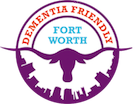PROFESSIOAL EDUCATION
Dementia Friendly Fort Worth is pleased to provide information from a variety of sources regarding available dementia education for healthcare professionals. Information is provided for in-person events, live virtual events, and on-line courses and podcasts.
Some of the classes offer continuing education credit for nurses, social workers, LPCs and other healthcare professionals. Costs and details are provided for each event or on-line course. Hover over the title of the course to link to the course information.
Caring for the Caregiver
Care for the caregiver is a critical intervention in dementia care. Caregivers offer essential reports about the cognitively impaired care recipient, and caregiver wellbeing is a predictor of how long individuals with dementia are able to live in the community before moving to a long-term care facility.
Referral to Community Resources
Effective care for patients with dementia requires partnership with community service providers who have specialized expertise and can meet needs where patients live.
In many cases, caregivers and people living with dementia are too overwhelmed to seek out these resources on their own. Direct clinician referral to community-based organizations (CBOs) can help. These referrals should be standard interventions for patients with dementia and their caregivers.
 James L. West offers a variety certifications and training for healthcare professionals wanting to enhance their dementia care knowledge and skills.
James L. West offers a variety certifications and training for healthcare professionals wanting to enhance their dementia care knowledge and skills.
- Dementia Live™ Coach Training
- Compassionate Touch™ Coach Training
- Dealing with Dementia for Professionals, A program of the Rosalynn Carter Institute for Caregivers
- Positive Approach© to Care – Teepa Snow Certified Trainings
For more information on our professional trainings or if you are interested in bringing one our programs or speakers to your group contact Jaime Cobb, V.P. of Community Education, at jcobb@jameslwest.org or 817-877-1199.
ON-LINE EDUCATION
Determining Decision-Making Capacity
Discussion on Various Forms of Dementia
Behavioral Management in Dementia: Assisting in Transitions to Memory Care
 Morningside Ministries is a provider of senior living in the San Antonio area. mmLearn offers education for caregivers. Click on the title to access these resources.
Morningside Ministries is a provider of senior living in the San Antonio area. mmLearn offers education for caregivers. Click on the title to access these resources.
DOWNLOAD THESE EBOOKS FOR CAREGIVERS
Family Caregiver Guide: Caring for a Seniot at Home
Activities for Dementia Patients: Purposeful Acivites for All Stages
Sundowning: Difficult Behavior at the End of the Day
Most Common Types of Dementia: A Caregiver’s Guide to Alzheimer’s Disease, Vascular Dementia, Lewy Body Dementia and more.
HOW TO IDENTIFY AND ADDRESS APATHY CAUSED BY DEMENTIA
Losing interest or motivation is a common occurrence that everyone experiences. But what happens when apathy is a symptom of serious cognitive decline? According to a 2018 article published in Current Opinion in Behavioral Sciences, apathy is the most common neuropsychiatric symptom in patients with Alzeheimer’s disease,External link:open_in_new a type of dementia.
“What we see often is that apathy is a symptom that can give a lot of information about the trajectory of the disease and what’s going on with the individual,” said Brianna Garrison,External link:open_in_new an expert in mental health for older adults and professor at Baylor University’s Diana R. Garland School of Social Work.External link:open_in_new Garrison says that apathy can cause a rapid decline in the functioning of patients and affect quality of life, resulting in older adults not being able to care for themselves.
“Apathy is often misunderstood in dementia and can be mistaken for a lack of behavioral disturbance, making it easy to overlook as a warning sign of further decline,” she said.
When caring for older adults, it’s important to pay close attention if they begin to display signs of apathy, which can look different depending on the individual. Social workers can play a role in working with older adults and caregivers by developing personalized plans that help stimulate engagement in activities and interests while offering other forms of support. READ MORE

